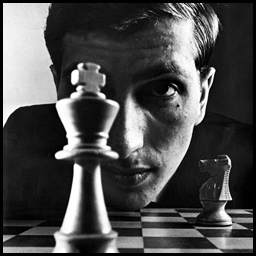a.k.a: The Bad Boy of Chess
Occupation: Grandmaster
Born: 1943
Died: 2008
Brief Description:
Bobby Fischer was born in Chicago to a Jewish mother who had moved from Switzerland to the US. The actual identity of his father is unknown. So Bobby grew up with his mother and older sister. When he was six, his sister bought him a chess set and he learned to play from the instructions.
A few years later, Bobby joined the Manhattan Chess Club. At age 13, he defeated the winner of America’s Chess Championship by sacrificing his queen. This game became known as the game of the century. One year later, he won his first US Chess Championship, the first of eight. Later that year, he set the record for becoming the youngest chess Grandmaster.
In 1972, Bobby Fischer played against Boris Spassky for the World Chess Championship title. The game was seen as a proxy battle for the Cold War between the US and the Soviet Union. And although he hated most Soviet players and accused them of collusion, he had respect and affection for Spassky. He ended up winning, thus becoming the first and only American to win the World Chess Championship in the 20th century.
Bobby did not defend his title in 1975 and then disappeared from the chess scene for almost 20 years, after which, he played a rematch against Spassky and won again. This was his last time playing chess in public and only time since his world championship title.
He died of illness at the age of 64, coincidentally the number of squares on a chessboard.
Why he’s on the list:
Bobby Fischer found his passion in chess and went to the extremes to develop his skills.
He read books, analyzed games, and even played against himself because he had no one else to play. He played for the fun, for the challenge, for the love of the game.
Chess was his life.
He loved the imagination and creativity that chess offered and eventually came up with his own chess variant (Chess960) which rendered the memorization of opening moves rather impracticable, thus compelling the players to rely on their talent and creativity instead.
“Let’s play. I’m willing to play anywhere,” says Bobby.
This leads me to my second point. You can’t be so passionate about an activity and so skilled at it and yet remain modest. Modesty is for average people. When you’re consumed by something, you want to prove to yourself and the world that you’re invincible. In Bobby’s words: “I am the best player in the world and I am here to prove it.” It’s a natural consequence of the love of a game rather than mere arrogance, as many tend to think. Provocation is just another way to challenge yourself further, push the limits, be the best, as you’re being put on the spot by those waiting your downfall.
Today, he is still regarded by many to be the best chess player of all time but it’s his love for playing rather than his status that puts him on my list.
